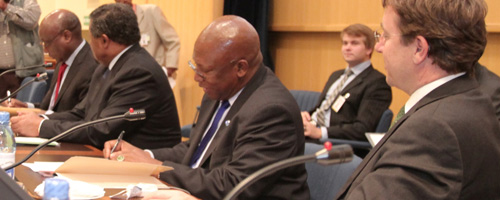ClimDev-Africa seeks to guide the effective integration of climate information and services into development planning, while ensuring the mainstreaming of climate considerations into policies and programmes directed at achieving the MDGs.
 13 October 2010: The Climate Information for Development in Africa (ClimDev-Africa) programme was officially launched on 13 October 2010, during the Seventh African Development Forum (ADF) in Addis Ababa, Ethiopia.
13 October 2010: The Climate Information for Development in Africa (ClimDev-Africa) programme was officially launched on 13 October 2010, during the Seventh African Development Forum (ADF) in Addis Ababa, Ethiopia.
In attendance were Abdoulie Janneh, UN Under-Secretary-General and Executive Secretary of the Economic Commission for Africa (UNECA), Jean Ping, Chairperson of the African Union Commission (AUC), and Donald Kaberuka, President of the African Development Bank (AfDB). ClimDev-Africa, a joint initiative of the AUC, the UNECA and the AfDB, aims at guiding the effective integration of climate information and services into development planning, while ensuring the mainstreaming of climate considerations into policies and programmes directed at achieving the Millennium Development Goals (MDGs) and sustainable development in Africa.
At the ceremony, Ping underscored the need to address climate change issues with “added seriousness” to ensure that Africa remains on the path of sustainable development. Anthony Nyong, AfDB, explained that ClimDev-Africa will build capacities of relevant African institutions for enhanced information generation and analysis and policy making. To that effect, the programme will build lasting policy capacity to adequately respond to the challenges of climate change, adding distinct value to the many ongoing activities related to climate change in the region. He noted that ClimDev-Africa will focus on enabling climate-related information for multi-stakeholder decision making and funding pre-investment activities, with initial beneficiaries of the programme including: the Regional Economic Communities; regional climate, weather and water organizations; national governments and institutions, including parliaments and National Meteorological and Hydrological Services; NGOs and civil society organizations; and African climate negotiators. [AU Press Release] [AfDB Press Release]